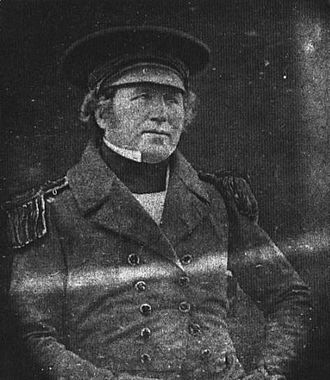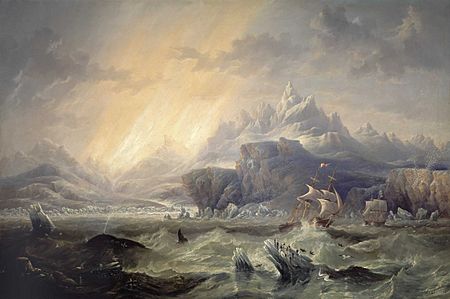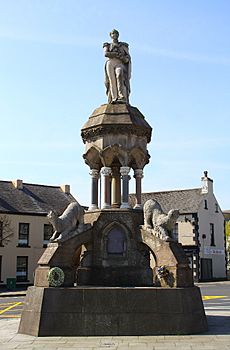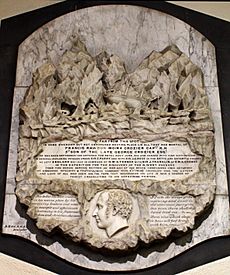Francis Crozier facts for kids
Quick facts for kids
Francis Crozier
|
|
|---|---|

Crozier in 1845
|
|
| Born | 17 October 1796 Banbridge, County Down, Kingdom of Ireland |
| Disappeared | |
| Allegiance | |
| Branch | |
| Service years | 1810–1848 |
| Rank | Captain |
| Ships |
|
| Expeditions | |
Francis Crozier was an Irish officer in the Royal Navy and a brave polar explorer. He went on six big trips to the very cold Arctic and Antarctic regions.
In 1845, he was second-in-command to Sir John Franklin on an important journey. This was the Franklin expedition to find the Northwest Passage. Sadly, this journey ended with all 129 crew members disappearing.
Contents
Early Life
Francis Crozier was born in Banbridge, County Down, Ireland, in 1796. He was one of 13 children! His father, George Crozier, was a lawyer. Francis went to school in Banbridge and lived in Avonmore House, a home his father built.
At just 13 years old, Crozier joined the Royal Navy in 1810. In 1814, he visited Pitcairn Island and met some of the last surviving mutineers from the famous HMS Bounty ship.
Crozier joined Captain William Parry's second Arctic trip in 1821. He was a midshipman on Parry's HMS Fury. He went north again with Parry in 1824 on the ship HMS Hecla. During this trip, Fury sank near Somerset Island.
Crozier became a lieutenant in 1826. A year later, he joined Parry again to try and reach the North Pole. This attempt was not successful.
During his journeys, Crozier became good friends with explorer James Clark Ross. Crozier was very good at studying stars and magnets. Because of his work, he became a member of the Royal Astronomical Society in 1827.
In 1831, he served on the ship HMS Stag off the coast of Portugal. In 1835, he joined Clark Ross again to help search for 12 lost British whaling ships in the Arctic. Crozier was promoted to commander in 1837.
Ross Expedition
In 1839, Crozier joined James Clark Ross again for the Ross expedition. This was a four-year trip to explore the Antarctic continent. Crozier was second-in-command and captain of HMS Terror. The other ship was HMS Erebus.
In 1841, Crozier was promoted to captain. The ships returned in 1843. They had explored deep into the Antarctic ice and discovered many new places. These included the Ross Sea, Ross Island, Mount Erebus, and the Ross Ice Shelf.
Crozier was recognized for his excellent work on magnetism. He became a member of the Royal Society in 1843.
Franklin Expedition
In 1845, Crozier joined Sir John Franklin as captain of Terror. This was for the Franklin expedition to find the last part of the Northwest Passage. Crozier was considered to lead this trip, but he was not chosen.
After Franklin died in June 1847, Crozier took command of the expedition. What happened to him and the other crew members was a mystery for many years.
In 1859, a note written by Crozier and James Fitzjames was found on King William Island. The note, dated April 25, 1848, said that the ships were stuck in thick ice and had been left behind. It also said that nine officers, including Sir John Franklin, and 15 crewmen had died. The note mentioned their plan to walk towards Back's Great Fish River on the Canadian mainland on April 26.
Some Inuit reports from 1852 to 1858 suggest that Crozier and another crew member might have been seen near Baker Lake. This area is about 400 kilometers (250 miles) south. Later searches found items, graves, and human remains of the Franklin crew on Beechey Island, King William Island, and the Canadian mainland.
Ships' Location
In 2014, an expedition found parts of a boat and a wooden object near King William Island. These items had Royal Navy markings. The expedition then found one of Franklin's ships, the Erebus, in good condition. It was at the bottom of the Queen Maud Gulf.
In 2016, a well-preserved ship matching the Terror was found in Terror Bay, off King William Island. Explorers are still studying these shipwrecks.
Legacy
In January 2008, Crozier's hometown of Banbridge held a special event to remember him. Many of Crozier's family members and descendants of other explorers attended.
A memorial for Sir John Franklin and his men was put up in London in 1858. It was moved several times and is now at the entrance of the former Greenwich Royal Naval College. A service was held there in 2009 to celebrate their contributions.
Places Named After Crozier
Many places are named after Francis Crozier, especially in the Arctic and Antarctic:
- Cape Crozier on Ross Island, Antarctica
- Cape Crozier on King William Island, Canada
- Cape Crozier on Banks Island, Canada
- Crozier Strait between Cornwallis and Bathurst Islands, Canada
- Crozier River, near Fury and Hecla Strait in Canada
- Crozier Point on Spitsbergen, Norway
- Crozier Channel, north of Banks Island in Canada
- Crozier Island in the Kennedy Channel, between Greenland and Ellesmere Island
- The lunar crater Crozier on the Moon
- Crozier Hill, Victor Harbor, South Australia
- Crozier Place, a street in Stanley, Falkland Islands
- The ship HMS Crozier was named after him in 1919.
- Francis Street in Keilor Park, Melbourne, Australia
In Books and TV
Francis Crozier is a character in the 2007 book The Terror by Dan Simmons. This book tells a made-up story about Franklin's lost expedition. Crozier is also in the 2018 TV show based on the book, played by Jared Harris. In both the book and the show, Crozier is the only survivor and joins an Inuit tribe.
 | Ernest Everett Just |
 | Mary Jackson |
 | Emmett Chappelle |
 | Marie Maynard Daly |




